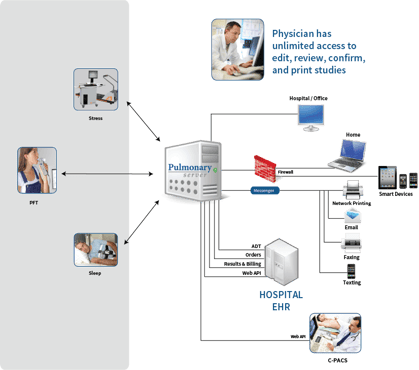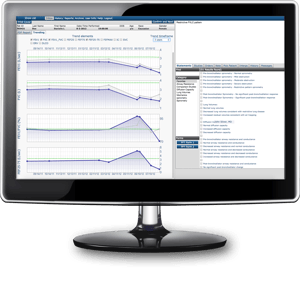Kevin McCarthy, retired Manager, Pulmonary Function Laboratories at Cleveland Clinic, talked with us about implementing Epiphany to manage PFT studies across their hospital organization. Kevin recalled:
I directly managed over twenty full pulmonary function laboratories at Cleveland Clinic’s main campus and outpatient clinics. In addition, we had eight hospital-based pulmonary function laboratories within our system. While the laboratories I managed were able to generate a preliminary report electronically within minutes of
test completion, the interpretation process was paper-based because we could not find software that would manage the process efficiently.
The laboratories at the eight regional hospitals had a workflow that ended in a paper report and an inefficient interpretation process. This process resulted in the final, signed paper report being scanned into the electronic medical record, sometimes with deferred turnaround times.
When we saw the Epiphany PFT product it appeared that it represented a means to incorporate a standardized process that would result in consistent test results across the health system. We began a workflow analysis and, with the help of the Respiratory Therapy Managers and Pulmonary Function Technologists at the main campus and each regional hospital, we embarked on a process that standardized the pulmonary function order lists, appointment names, procedures, reports and interpretation of test results. When this was completed, we had consistency in the pulmonary function testing process across the health system.
Epiphany provided the tool that allowed interpreting physicians to have easy access to the tests (access from any workstation within the health system) and an efficient means of applying a standardized interpretation and electronic signature, completely eliminating the paper process. We were successful in meeting our goal of a 24 hour turnaround time for getting interpreted tests into the patient’s electronic medical record.

Cleveland Clinic’s Workflow Challenges Before Pulmonary Server:
-
Complete reliance on a paper-based reporting process at some sites
-
Multiple software applications required for different vendors
-
Varied ordering and scheduling processes across the health system
-
Varying testing procedures across the health system
-
Multiple reporting methods for test results
-
Delays in interpretations reaching the EMR
-
Labor-intensive, multi-step interpretive processes involving scanning and paper
Kevin looked at the test interpretation software of all of the PFT hardware manufacturers in use across the health system and considered implementing a hardware change throughout their entire system. When he learned that Epiphany had adapted its software from Cardiology to PFT, Kevin decided to see exactly what Epiphany’s Pulmonary Server had to offer. Kevin concluded:
The bottom line is this: I saw that it was not necessary to standardize the hardware of the testing devices as all of the devices could generate a PDF report electronically and this is presented to the interpreting doctors. I thought, “Yes, this is really what I envisioned. Physicians had rapid and easy access to Epiphany from any workstation in the system, the PDF reports took only a few seconds to present to the physician, and the user-interface was simple to learn and use.”
After Implementation of Epiphany Software:
- Standardized PFT orders

- Standardized PFT scheduling
- Standardized PFT procedures
- Standardized PFT reports
- Preliminary report immediately after test completion including flow-volume and volume-time tracings
- Final interpreted report within 24 hours of test completion
- Easy access to interpretation queue
- Standardized interpretive statements
- Ability to trend or review prior test results
- Compliance with the international recommendations for interpretive strategies (incorporation of the lower limit of normal in the reports and interpretation)
- Freedom to select a vendor at will for future purchases or replacements
Cleveland Clinic now has four different PFT vendors integrated with Epiphany and the EMR, so they are no longer tied to any specific vendor. This flexibility gives them the freedom to select a vendor for future purchases or replacements that best meets the needs of the intended laboratory site.
Reflecting on the improvements that Epiphany brought to Cleveland Clinic, Kevin stated:
Pulmonary Server helped us standardize practices across the health system. Epiphany was able to tailor the software to meet the specific needs of our hospitals.
About Cleveland Clinic:
Located in Cleveland, Ohio, Cleveland Clinic is a nonprofit, multispecialty academic medical center that integrates clinical and hospital care with research and education. U.S. News and World Report ranked Cleveland Clinic as #2 in the Nation for Best Hospital, #1 in Cardiology & Heart Surgery, and #3 in the Nation for Pulmonary Services. Today, with more than 1,400 beds on Cleveland Clinic’s main campus and 4,450 beds system-wide, Cleveland Clinic is one of the largest and most respected hospitals in the country.






